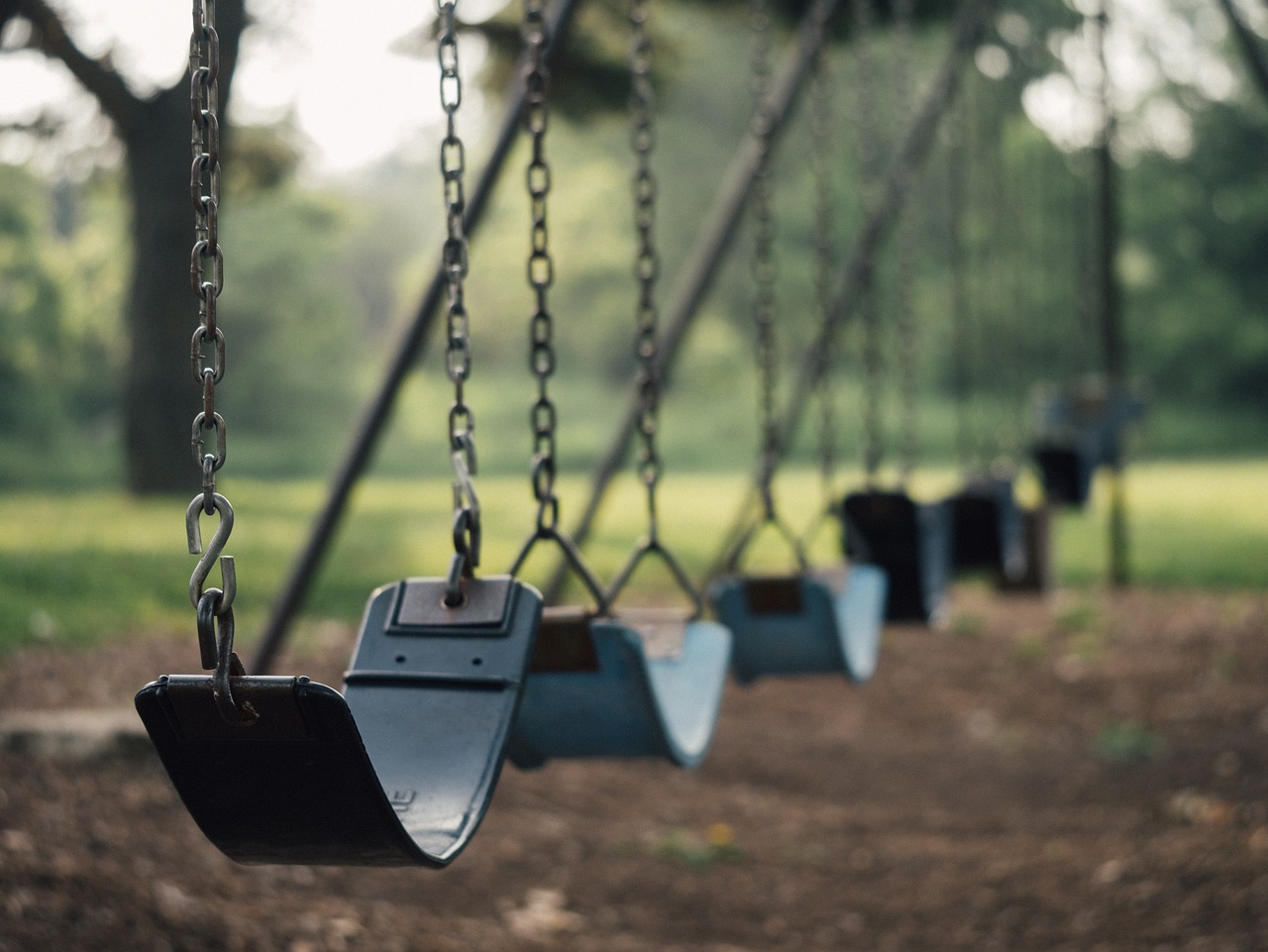It was mid-February and my two-year-old twins and I were enjoying some unseasonably warm weather and decided to head to the park. When we got there, we realized many people had the same idea because there were about 15 other kids between the ages of 1-7 running around. Being on my own with two little kiddos at a busy park makes me feel a little stressed because at this point they are almost always running in opposite directions.
We started off just fine on the playground and then my daughter decided she wanted to swing. The swings are only about 10 feet from the playground so I thought I would have no problem keeping an eye on my son. There was another young girl (I am guessing between 2-3 years old) who was there with her mother. Charlie, my son, cut her off on the stairs and forged ahead which I could tell frustrated the other mother. I gently called out to Charlie to please wait his turn and watch out for others who are playing. However, the same situation quickly happened again. The other mother huffed and shot me a dirty look. I could feel my anxiety level start to rise and the pit in my stomach deepen. My first instinct was to yell at my son . . . but I caught myself before I did.
I know my son didn’t mean any harm and my yelling would have only been to let the other mom know I was doing my best to keep my son from jumping the line again. I took my daughter out of the swing so I could go talk to my son which caused an extreme meltdown since she wasn’t ready to be finished. Her crying and screams led to more stares and more nervous energy for myself. I again wanted to jump to the quick fix solution and head home. As we started to pack up I stopped and asked myself, ‘why am I doing this?’ We were having a nice time and neither of the kids were ready to leave. I decided instead to go over and apologize to the other mother and her daughter and let them know Charlie didn’t mean to cause any frustration, and I was sorry if her feelings were hurt when he jumped ahead of her. Let’s just say her reaction was less than pleasant and indicated I needed to keep a better eye on my kids. The whirlwind of shame swirled like a tornado around me.
Shaming and judging other parents has become an epidemic. I feel like since the moment you become pregnant everyone starts offering unsolicited advice. Everyone seems to have an opinion and think they know best. Similar situations have happened in restaurants, the grocery check-out line or at the mall. Have you ever stopped to think about how many times you feel judged about your parenting throughout the week? Maybe it’s your mother telling you it’s time for toddler beds, or your sister’s eye roll that your kids can’t have a slice of cake before bed, or your best friend’s disgusted reaction to only giving your kids a bath every other day. Do you catch yourself acting different around different people? I started to notice I would try to be more laid back around certain people and others I would feel the need to be stricter. That is a quick way to lose yourself as a parent. I also found that I started to judge myself based on the worries others had filled my head with. Was my child not catching on to sports fast enough? Should they be potty trained already? Why did Olivia not share as well as Sarah? These are the questions I caught circulating in my mind.
I think as a parent it is healthy to evaluate and ask questions, however, they need to stem from the right place. I was continually judging myself and my kids based on what others thought or said. How confusing this must be for our kids! One minute we are patient and the next we are snapping about something that wasn’t an issue yesterday. Something that helped me evaluate all the judgement was taking a look at the judgements I was putting on others. It is so difficult to shut down those thoughts that pop up so quickly. I find this to be like building a muscle; it takes a lot of work and repetition but we can continually get better at it the more we focus.
I don’t think the discomfort of judgement will ever fully go away, but these are the steps that have helped me stay true to the parent I am no matter who I am around:
1) Mantras
Mantras are a powerful way to self-regulate in the moment. When it comes to judgment, my favorite mantra is ‘what is right for their family has no effect on my family’. Other favorites include ‘this is not an emergency’, ‘be the calm not the chaos’ and ‘my child is having a hard time not giving me a hard time’. Mantras can sound silly but once you find one that works for you, it is a great way to stop in the moment and calm yourself.
2) Family Values
I sat down with my husband and we created a list of our top family values. This is the foundation and building blocks of our family. By being more rooted in our values and knowing what is important, it is easier to stay true to what we believe is right for our kids and not be so easily influenced by outside opinions. Safety is important to us and my son was not hitting or doing anything unsafe at the park. It is not polite to cut someone off, however there was no bad intent behind trying to reach the slide first. He simply has not developed the skills yet to be courteous to others all the time. Ask yourself in the moment, ‘what is the lesson/value I want to teach my child in this situation?’
3) Understanding Child Development
The more I learn and study about developmental stages, the more I understand my children and the right ways to approach them. For one thing, yelling never truly helps fix an issue even though that is typically our first gut reaction. My son cut off the other girl on the playground because he hasn’t developed impulse control yet. Yelling at him would have solved nothing. Stopping and explaining why waiting our turn is important and other ways to go about the situation is the consistency needed to make an impact over time. Many times, we expect so much of our kids and think they should be further along than they are but their little brains just aren’t ready yet. Finding ways to stay peaceful and coach them during these moments is what will make us feel more connected to them. Connection is what leads to cooperation.
4) Empathy
Giving empathy to ourselves and others is vital. This is what allows us to work through our own pain and recognize the pain in others. All feelings are intensified when we are in an emotional state. Self-empathy is what will allow us to stop and truly reflect on what is the right reaction for us and our children based on the situation. Not everything needs to be solved the moment it happens. A little reflection can lead to a more thoughtful reaction and more long-term success. I know that is not an easy thing but with time it will become more natural.
As Brene Brown says, “Imperfections are not inadequacies; they are reminders that we’re all in this together.”
*****
Sabrina Sandberg is a certified Peaceful and Conscious Parent Coach and blogger based in Denver, CO. Sabrina is passionate about educating and empowering parents and you can catch her daily tips by following Peace at Heart Parenting on Facebook/Instagram or connect at www.peaceatheartparenting.com.





